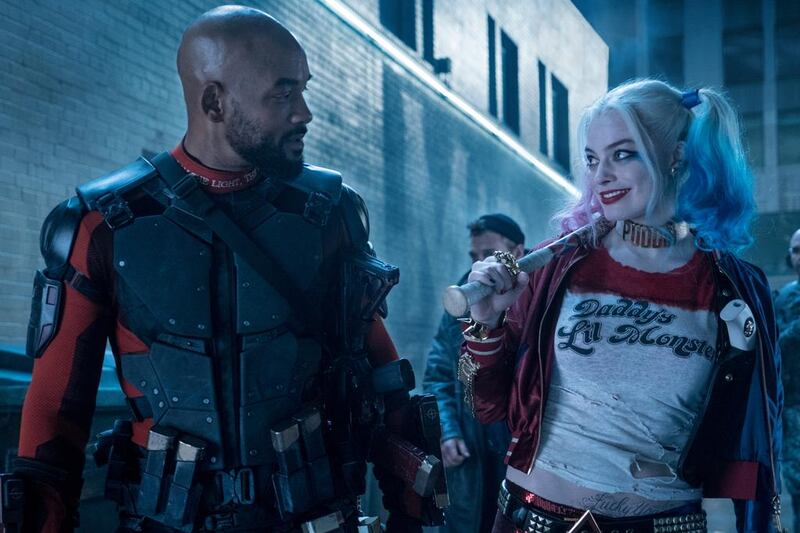At the screening of Suicide Squad for the media in London this month, the tension was palpable.
“We’ve taken some hits,” said producer Chuck Roven – a pointed reference to the early negative reviews this latest DC Comics movie adaptation had received from critics in the United States.
"Mediocre storytelling ... reliance on ghastly CGI and overblown stylistic flourishes," according to trade publication Screen International. "This botch job makes Fantastic Four look good," Rolling Stone concluded. Ouch.
In the face of such relentlessly bad reviews, the fans hit back.
One DC flag-waver, Abdullah Coldwater, started an online petition titled "Don't listen to film criticism", with the aim of shutting down Rotten Tomatoes, the website that aggregates critics' scores – and currently ranks Suicide Squad at a mere 26 per cent.
Talk about shooting the messenger. Coldwater seems unaware that Rotten Tomatoes is simply a portal for collecting and averaging reviews from other outlets. Yet more than 21,000 people have signed his petition.
“There is a disconnect between critics and audiences,” Coldwater wrote, a sentiment that sums up the widening gap between fanboys and reviewers.
It is hard to deny such a gap exists – certainly as far as the latest movies based on DC comics’ characters are concerned.
Zack Snyder's 2013 Superman reboot Man of Steel was poorly reviewed, yet made US$668 million (Dh2.45 billion) at the global box office. This year, the follow-up, Batman v Superman: Dawn of Justice grossed $872m despite a critical panning.
The reception and early box-office results for Suicide Squad suggest a similar pattern. The fans turned out in force during the opening weekend, generating a record-breaking August box-office haul of about $135m in North America alone.
So why do audiences flock to films that the reviews say are so bad? Are the critics simply wrong? Do they dismiss comic-book movies as childish, lowbrow entertainment?
This is clearly not the case. The reviews for movies from DC’s rival, Marvel, are often positive.
This year's Captain America: Civil War hit 90 per cent on Rotten Tomatoes. Even Deadpool, starring Ryan Reynolds – this year's spin-off from the X-Men movies, and a film far more anarchic than Suicide Squad – has an 84 per cent rating.
The first thing to note is that diehard comic-book fans are a loyal, forgiving bunch. They will come out and support just about any superhero movie, good or bad.
It’s understandable. With Holly-wood embracing the superhero movie as its blockbuster of choice, it is their time. It’s as if the nerdy, unpopular kid from school has suddenly been voted class president.
What this doesn't explain is why the DC movies are failing to please professional critics, while the Avengers-related films from the Marvel Cinematic Universe are generally applauded. Some would point to Snyder, who set the current DC template with Man of Steel: dark themes, po-faced, humourless plots and lots of CGI.
The super-villain ensemble Suicide Squad (on which he is an executive producer) follows on directly from Batman v Superman, and director David Ayer seems shackled by the universe Snyder has established.
There have also been reports that the studio imposed changes to Ayer's original vision for the film, ordering reshoots to lighten the tone. Batman v Superman also seemed to suffer at the hands of studio intervention. When the longer, "ultimate edition" of the film, featuring Snyder's original version before cuts, was released on home media, it received better reviews than the theatrical version.
Whatever the behind-the-scenes problems, the fact is that compared with Marvel's lighter approach – films such as Guardians of the Galaxy and The Avengers do not take themselves too seriously, at least not all of the time – the DC films seem leaden.
Are they simply too dark for critics’ tastes, then? If so, why did Christopher Nolan’s Batman trilogy receive near-universal acclaim? Those films took a more adult, real-world approach.
Nolan was an executive producer on Man of Steel and Batman v Superman, both of which were co-scripted by his Batman Begins screenwriter David S Goyer. But somehow Nolan's approach has been lost by Snyder, who seems more in love with carnage than character. Watching apocalyptic levels of destruction is all very well – Marvel movies are also guilty of that – but if we're going to go to such extremes, then a little levity along the way is essential.
How the reception to Batman v Superman and Suicide Squad will affect future DC movies remains to be seen. Warner Brothers has plans for 10 more DC movies between now and 2020 – beginning with next year's Wonder Woman, then Justice League.
As long as the fans keep buying tickets, the movies will continue, even if the quality is variable and the critics hate them.
But even the most diehard DC fan must know, deep down, something needs to be done.
The recent promotion of long-time DC Comics writer and chief creative officer Geoff Johns – one of the driving forces behind the success of DC's television hits Arrow, The Flash and Legends of Tomorrow – to president of DC Entertainment, giving him a leading role in developing future films, is perhaps a sign that changes are in the air.
Given what can be possible – be it Nolan’s approach or the Marvel Cinematic Universe model – perhaps the online petition should be to shut down Zack Snyder.
artslife@thenational.ae





